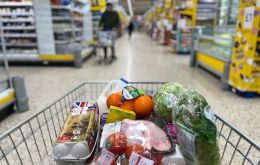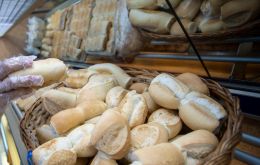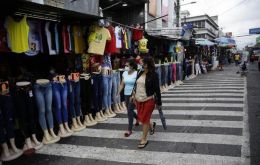MercoPress. South Atlantic News Agency
Tag: food prices
-
Saturday, March 8th 2025 - 10:51 UTC
Lula plans bold measures to keep food prices from soaring

Brazilian President Luiz Inácio Lula da Silva said Friday that he might need to take bold measures to keep food prices from soaring, thus affecting consumers. He also blamed “robbers” for the high price of eggs nationwide.
-
Wednesday, August 9th 2023 - 03:15 UTC
UK food prices are slowing; 'cautious optimism' from British Retail Consortium

New figures suggest food United Kingdom price inflation has slowed to its lowest level this year as prices of oils, fish, and breakfast cereals fall. According to the British Retail Consortium (BRC) and NielsenIQ retail analysts, food inflation slowed to 13.4% in July. It was 14.6% in June. But overall, shop prices are still 7.6% higher this July than a year ago.
-
Saturday, June 3rd 2023 - 13:00 UTC
Falklands lawmakers discuss food prices and market solvency to encourage competition

A spirited discussion surrounding food prices was prompted by a question from MLA Teslyn Barkman in Legislative Assembly last Wednesday, 31st May. MLA Teslyn Barkman asked MLA Gavin Short about the UK’s government’s decision to investigate food pricing. “Can the Honorable Gavin Short please say whether we here in the Falklands have any mechanisms or agency that could be used to investigate the grocery retail market?”
-
Wednesday, June 22nd 2022 - 10:44 UTC
More poverty and misery ahead for most Argentines as food prices soar

An Argentine household needs a monthly income of at least 100,000 Pesos equivalent to US$ 781 at the official rate, (128 Pesos to the dollar) or US$ 454 (free market, 220 Pesos to the dollar) to remain just above the poverty line, according to the latest estimate from the government's Stats Office, Indec.
-
Saturday, May 28th 2022 - 10:00 UTC
Thirty five countries have restricted exports to help domestic consumers but global prices have soared

At least thirty five countries have restricted exports of agricultural commodities in the last two years because of the Covid 19 pandemic and more recently, the explosion of prices as direct consequence of the Russian invasion of Ukraine and the overall instability in markets.
-
Thursday, May 12th 2022 - 10:10 UTC
Brazil consumer prices increased 1.06% in April and 12,13% in twelve months

Consumer prices in Brazil increased 1.06% from March, the fastest rise for the month of April since 1996, the Brazilian Institute of Geography and Statistics, or IBGE, said on Wednesday. Prices rose 12.13% from a year earlier, the fastest pace since 2003. In March, prices rose 1.62% from February and increased 11.30% from a year earlier. Again food and transport had a decisive impulse.
-
Monday, January 10th 2022 - 09:28 UTC
World food prices in 2021 remained 28,1% higher than in 2020, FAO report

World food prices fell slightly in December as international prices for vegetable oils and sugar fell significantly from lofty levels, the Food and Agriculture Organization of the United Nations, FAO, reported.
-
Monday, June 7th 2021 - 20:03 UTC
Food prices in May soared to its highest in a decade, FAO report

FAO – Global food prices rose in May at their fastest monthly rate in more than a decade, even as world cereal production is on course to reach a new record high, the Food and Agriculture Organization of the United Nations (FAO) reported.
-
Thursday, January 28th 2021 - 09:37 UTC
Argentine traders and millers discussing options to avoid a ban on wheat exports

Argentina is worried about domestic food prices and inflation, and as it happened a few weeks ago with an attempt to ban corn exports, a similar situation apparently is happening with wheat, and the different actors involved are working on measures aimed at securing the wheat supply and reasonable bread and pasta prices.
-
Wednesday, January 13th 2021 - 09:11 UTC
Brazilian 2020 inflation 4,5%, but food prices skyrocketed 14,1%

Inflation in Brazil ended 2020 at 4,5% the stats agency IBGE revealed on Tuesday, above the central bank's target, with food prices rising, 14,1%, the most in two decades.
